|

Interview with



Remembering The 20th Century:
An Oral History of Monmouth County
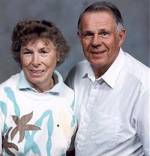 |
| Lydia and Charles Wikoff,
present day |
Date of Interview: September
7, 1999
Name of interviewer: Lydia Wikoff
Premises of Interview: Ms. Wikoff's home, Manalapan, NJ
Birthdate of Subject: N/A
Please note: Ms. Wikoff conducted
a self-interview as a part of Remembering the 20th Century: An Oral
History of Monmouth County.
Q: Who were the people
that influenced your life in Monmouth County?
A: I would say my family:
my mother, father, aunts, and uncles. My father farmed, my mother taught;
I respected her as a teacher because she put her heart and soul in it
and almost to the point of neglecting her children; she was so conscientious.
She really taught only because farming was not bringing in enough income.
|
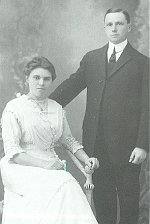
|
|
Lydia's parents, Oliver
Stillwell and Grace Hodapp Stillwell in 1912 |
Q: If you could talk to each
person who made some mark on your life, what would you like to tell
them?
A: I think I would tell my
mother that I appreciated all that she did for us because we probably
wouldn't have been able to stay on the farm without her efforts. I would tell my
dad I
loved him dearly and I learned many, many wonderful, lasting impressions
from him.
Q: What locations in Monmouth
County have personal significance to you, and why?
A: Well, I would say this whole area.
I wasn't born here, I was born in Chesterfield, New Jersey, and
when I was two years old, my
family moved back to the original Stillwell homestead. I lived on that farm up until I was married.
I can recall no other home than the farm at Gordon's Corner. I
think I knew every inch of the farm, and I would play in the brooks and
had special spots that I would hike to and sit, and we had a spring on
our farm. My father would cart the water from the spring
because our water was very -- we would always say irony, which meant that
it had kind of rust in it, and it made everything rusty. So we carted
all of our water for drinking and cooking and if we were washing white
clothes.
Q: Is
there any historical background on Monmouth County locations that you
would like to share?
A: Well, I shared much
historical information with people in my township. I've been the historian
for the township for fifteen years and over the years I've answered questions
about history, genealogy, and things that I think have been
appreciated.
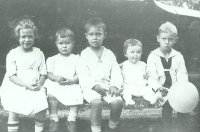 |
| Lydia's siblings on far
right, Eleanor and Hamilton, joined by their Appleby cousins, (far left)
Betty, Ted, and Bud |
Q: How would you describe
Monmouth County in your childhood?
A: Well, it was so entirely
different that it's hard for me to acquaint you with how it was. There
were farms, blacksmith shops, and mills. The present Route 9 was then
(1924-1939) a dirt road called The Amboy Road. It was a seldom traveled
road. Parallel to that road was a macadam road leading to Matawan and
Keyport. Before my time it was called Patten Turnpike: a toll road owned
by Patten. These roads had tollbooths. One hundred years ago all the "toll"
roads were bought by the county. This road was important as it lead to
the Matawan and Keyport ports which ferried the farmers' grain, vegetables,
poultry, etc. to New York.
To return to the dirt road
in front of our home. My dad was called overseer of that section of the
road. This meant that he scraped it to smooth out the potholes and bumps
and he also plowed it in the winter. I believe that he must have been
given something off on his taxes, but I really don't know. I recall vividly
helping out cars when they would get stuck in the mud or snow.
The overseer was a farmer who
lived closest to the road. He would have a scraper and scrape whenever
it was needed. I remember there was a very muddy section on that road.
One time a car overturned and a very large woman passenger waited on our
front lawn. She was covered with tattoos. We later found out that she
was in the circus. This dirt road existed until I was fifteen years old.
There was the advantage of living on a little used road as there was no
thought of danger when riding bikes or playing near the road. We were
the last in the township to get electricity and used kerosene lamps. Those
Aladdin kerosene lamps are now considered valuable antiques, but I can
assure you that it was no fun cleaning the chimneys on a daily basis.
Running through our farm was a very narrow dirt road, which we called
the New Road. When I looked into why it was named the New Road, I discovered
that it had been purchased from my grandfather in 1835. When the township
planning board was first organized, and were naming the roads, they named
it for the adjacent brook, Pine Brook. A neighboring farm was owned by
an elderly lady named Lib Quackenbush. She lived like a recluse; however,
she did drive her horse and buggy to church every Sunday. We could almost
set our clocks by her regularity as we would see her pass. One Sunday
when the time had changed she was not aware of it, so my father went out
to tell her. She was the last to drive her horse to Old Tennent Church
and hitch it in the shed under her name. The church still has the plaque
with her name on it. Her farm is now the location of Covered Bridge,
a retirement community, built thirty years ago. A historical society was
started about that same time. Charles and I were charter members. We knew
the history of that farm, which was owned by David Forman in 1732. We
have a wealth of history about David Forman, who was a Revolutionary War
hero in Monmouth County. The Society, called the Battleground Historical
Society, asked the developer, Mr. Hovnanian, if he would save the oldest
portion of the house. He graciously said that he would, and he saved that
and the barn. The house has been boarded up since that time. The Society
has asked The Covered Bridge Association, which now owns it, to make it
available for public viewing. We hope that someday the people of Covered
Bridge will appreciate its historic value and make it a historical landmark.
What is now called Highway 9 was built in 1939. As it was being built,
and before it opened, we could ride our bikes for miles. A nice memory
is that my husband, who lived in Tennent, rode his bike to see me. In
fact, you might say, he courted me on his bike. We were high school friends,
and following his service in the Army in World War II, we were married
in 1946. There have been so many changes that it is hard to describe
the area as it was. We are just completely surrounded by developments
now, so there really is nothing but our farm that is the same.
Q: Describe the significance
of the souvenirs or keepsakes that you have.
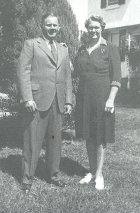 |
| Charles and Jane Wikoff,
(Charles Jr.'s parents) 1944 |
A: Well, I have keepsakes that
belonged to both families; my husband Charles' family had lived here in
Freehold Township area since 1831, and they lost their farm during the
Depression, but they kept many of their keepsakes. When both parents passed away, these things were divided among Charles, the only son, and two
daughters. I treasure many of the things,
especially a toy train that Charles' dad had. It's an iron train which he had
gotten when he was ten years old, and it was his pride and joy, and it
now is ours and I have it sitting in a prominent place in my living
room. I have many old pieces that were given to me by a family called
the Quackenbushes, who had no heirs, and so the nieces and nephews were
bequeathed their estate. I was very young at that time, I think I was
only sixteen, so my mother and father kind of picked out the things as
we took turns dividing up the beautiful old homestead. In fact, in
magazine articles, that house was called a mansion. It's just a shame
that was torn down. It was in Marlboro Township, but very close to
Manalapan on Wickatunk Road.
Q: What were your favorite
books?
A: I had a great many
favorite books; I loved the fairy tales, Grimm's fairy tales, and the
Nancy Drew books.
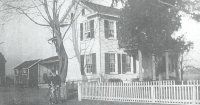 |
| George Stillwell is shown
(ca. 1900) with his dog in front of his home near Gordon's Corner,
Manalapan. George is Lydia Wikoff's grandfather. Seven generations have
lived on this farm that is now farmed by her sons Charles III and James
Wikoff, and her husband Charles Wikoff Jr. |
Q: What do you know about your
ancestors?
A: Well, I'm very interested
in genealogy, and hence I know quite a bit about both my ancestors and also Charles'.
The Wikoffs are very well recorded; they came in the 1620s and settled in New York, near
Flushing. That was a
farm area in those days, and that home has been restored. There's a Wyckoff
Association, which got together enough funds to purchase the house and
restore it. Right now it is on the historic register, of course, and New
York State helps fund it and it is a museum and many school children visit it.
We've been there to see it and it's
just a beautifully restored Dutch cottage.
Q: What were some of medical
practices when you were growing up?
A: They were very different
then today. You only went to the doctor when you were sick, you didn't
go on a regular basis. In fifth grade I had appendicitis, and Dr. Reynolds
was the doctor. Freehold had a hospital; that building still exists
on West Main Street. In those days, I guess then they tried to freeze
an appendix, so I was in the hospital with ice packs two or three times
and that didn't work. So then Dr. Reynolds finally had to operate and
he left me with a very large scar. People said he wasn't too great a surgeon.
But I lived and I'm thankful. People used to have to go to Trenton, so
at least I was lucky that the hospital was in Freehold.
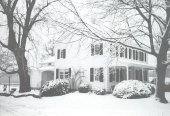 |
|
Charles and
Lydia Wikoff purchased this farmstead, built in 1851, on Tennent Road
near Gordon's Corner in 1952
|
Q: What were the trends in
your lifetime?
A: Well, let's see. Smoking was kind of a new thing, and I remember sneaking, learning to
smoke. It was unheard of that a girl should smoke, or that
anybody should smoke, my family thought. But I just did it just for the
devil of it really, and didn't want to too much. When I was working in
New York I would smoke mainly because that was what you did when you took a
break,
but thank goodness the habit didn't linger with me very long. While I
was growing up, our social life was quite different from that of today.
Visiting among relatives was very frequent. Mother would invariably bake
a cake as we looked forward to visitors over the weekends. One never
would think of calling to say you were coming. In fact, not everyone had
a phone.
Q: What else do you recall about
your childhood?
A: Mother taught school in Hazlet, now Middletown Township. She
and her neighbor, Mrs. Jameson, took turns driving there. The school held
eight grades, and mother taught the fourth, fifth, and sixth grades. As it
was a farming community, mother would often give the children who missed school, because of helping on the
farm, extra help. Mother was a
dedicated teacher. I have met some of the pupils that she helped, and
taught, and bragged about what a great teacher she was. While she taught
I was being taken care of by a loving neighbor. I even doubt mother
paid her very much. It was just a wonderful growing up time for me. Our
son, Charles, now lives in that neighbor's house. Their farm was adjacent to ours, and when we wanted to add it to our farm,
we were able to purchase it.
Q: What memories do you have of school?
A: Well, I have a lot
of memories of school. I started out in Englishtown. In fact, to tell
you the truth, I never knew the word Manalapan, and yet that's where I
lived. But Englishtown was the hub; Englishtown was everything in those
days. You would go there for the barbershop, you would go there to get
your food, get your licenses, just do everything in Englishtown, so consequently
it was very important to me. Englishtown was the headquarters with two
grocery stores, a harness shop, clothing store, a barbershop, a bank,
an ice cream store, and a bakery store. In fact, in the nineteenth century,
the town of Englishtown was larger than Freehold. There was so much freedom
when going to school. During lunch hour you could walk downtown to get
ice cream, to get a haircut, or walk to the pond. During recess the teachers
led us in outdoor exercises, and then we could play games such as Ring
Around the Rosie, Alley Alley Over, baseball, marbles, and many other
games that I can't remember the names of. A beautiful asset in the town
was an historic village inn, which was a veranda tearoom, and on very
special occasions we would get a guided tour of the inn. While I was growing
up, people said it had been George Washington's headquarters for the Battle
of Monmouth. Now that the inn is owned by the Battleground Historical
Society, it has been researched, and we found that that fact cannot be
documented. Going to school on the bus was fun. I had to be good, because
the bus driver was a friend of the family. One day I was left off at my
friend's house and did not tell my parents. They were very upset, and
I suffered for that misdeed by going to bed without supper. I did not
have playmates because of the distance between farms, but I thought nothing
of that. I did miss not being able to join the Girl Scouts in town, though.
But I had my dog Lady for a pet. She was an English Setter, and when she
was properly bred, we could raise and sell the pups. I would spend hours
playing with Lady and her pups. There were also many barn cats. A farm
needed them to keep away the mice. My sister and I would dress them up
in doll clothes and put them in a baby carriage and wheel them around,
not always successfully, however. We always had one or two cows. When
my father was milking the cows, he would squirt the milk up in the air,
and the cats would jump to catch it. Dad would sit on a three-legged stool
and squirt the milk into a stainless steel pail. It was a tricky job to
maneuver so that the cow would not kick over the pail or switch her tail
in your face. Most of the time we were overstocked with milk. This meant
that mother would have to make pot cheese and butter; both jobs were very
time consuming. A few regular customers came to the house for milk. Of
course, it was not pasteurized, and when I first tasted pasteurized milk,
I did not care for it at all. A big disadvantage of having cows was that
they had to be milked morning and night. This meant that visiting was
curtailed to accommodate milking times. When I was a child, that seemed
to take away from the pleasures of visiting family and friends. But I
really enjoyed helping do the chores on the farm when I was old enough.
Some of the chores were gathering eggs, feeding the chickens, and taking
food to the pigs and the horses. I felt really important when I was strong
enough to help by putting hay in the hay mound. I would have to drive
the horse drawn cart, which pulled the hayfork up and over the spot where
the men in barn wanted to drop the hay. At that point, and very quickly,
you had to unhook the rope from the two-wheeled cart, turn around the
horse, and get back in position. This continued until all the hay was
properly stored in the barn. These are things that stand out in my memory
of my childhood. Another is of the tramps who were often walking the roads.
They usually stopped in and asked for food. Mother would always make them
something. They would hang around for a while, sometimes asking for work,
but we were relieved to see them go. Another memory highlight is
of when I was nine years old and was able to attend the newly opened
Radio City Music Hall to see the movie Showboat. Being able to
go to a movie was a big occasion. I remembered mostly seeing Shirley Temple
movies. As a teenager, I attended meetings at the Monmouth Grange, a farmers
organization. These meetings gave us the opportunity to get together with
other young people. Dances and card parties were also held.
Old Tennent Church played the
most important part in my life as I was growing up. There were so many
activities connected with the church, such as choir, picnics at the shore,
the girls' bible study group, and helping out at the church suppers. My
mother played the organ and the piano for all the events, so as a family
we spent a lot of our time there. I recall vividly the sinking of the
Morro Castle off Asbury Park, and the Lindbergh baby kidnapping registered
deeply. My folks were so worried about an open well on our farm that they
bought a concrete cover for it. During Franklin Roosevelt's presidency,
he put men to work during the New Deal. Dad applied to terrace our hill,
which was part of the CCC project to prevent erosion. I heard snide remarks
like, "Look at those men leaning on their shovels," but that
wasn't the case around here. Another F.D.R. project was a building of
a town near Hightstown called the Jersey Homesteads. A part of that project
was a coat factory. We would go there to buy our coats right from the
factory. Now that town is called Roosevelt. Trips in the car were also
big events. When the Holland Tunnel opened, we drove through it, as it
was such an engineering marvel. There was a ferry which operated from
Keansburg to New York, and that was a wonderful trip, too. In 1937 our
relatives were visiting Lakehurst the day that the Hindenberg exploded.
They came to our home from there to tell us about it. There was a lot
of talk about the building of the Marlboro State Hospital. Even though
we could not drive in there, we would drive by just to see those huge
brick buildings. The Englishtown school had a ninth grade, but there was
a time when Freehold High School was overcrowded and Freehold would no
longer take outside pupils. Therefore we were bussed to Jamesburg, a small
school of about seven hundred pupils. I believe that we were fortunate
in attending that high school. But World War II was commencing, and many
former advantages such as our trip to Washington, D.C. were discontinued.
There was great patriotism at that time. It was felt by all, and many
of our classmates enlisted. Two of them died in the war. My plans to enter
Douglass College were changed, and instead I entered into the two-year
Katherine Gibbs School. I close this episode of my life with the thoughts
that growing up during those years gave me a sense of belonging to the
farm. I am very thankful that after we married, and our lives continued
to be in farming.
|